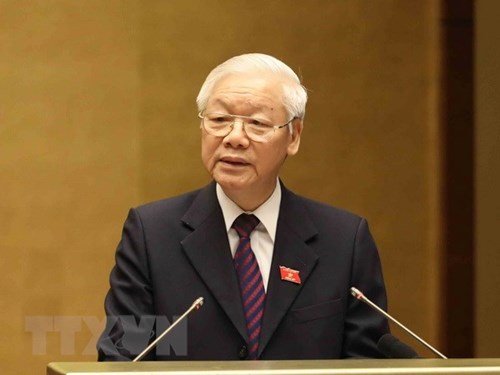Vietnam and 10 other member states signed the CPTPP in Santiago, Chile, on March 8, 2018. The 11 member states of the deal are Australia, Brunei Darussalam, Canada, Chile, Japan, Malaysia, Mexico, New Zealand, Peru, Singapore and Vietnam.
    |
 |
|
Party General Secretary and President Nguyen Phu Trong on November 2 presented a proposal to the 14th National Assembly for the ratification of the Comprehensive and Progressive Agreement for Trans-Pacific Partnership. |
The President’s proposal stressed that the early joining and ratification of the CPTPP would demonstrate Vietnam’s strong commitments to reform and comprehensive and extensive and intensive international integration.
Besides, through the pact, Vietnam can affirm its important role and geographical-political position in Southeast Asia and Asia-Pacific at large, while advancing its position within the Association of Southeast Asian Nations (ASEAN), in the region and the international area.
Specifically, in the context of rapid, complex and unforeseeable changes in the global and regional political and security situation, the CPTPP membership will enable Vietnam to improve its internal strength to cope with challenges, and consolidate its position so as to realize the foreign policy of independence, self-reliance, multilateralization and diversification of relations in tandem with enhancing national defense and security, the document reads.
Once put into force, the agreement will contribute to deepening relations between Vietnam and other CPTPP member countries, especially those having strategic partnership with Vietnam.
The proposal also pointed out the benefits along with challenges to be brought by the free trade deal to socio-economic development, State budget and the finalization of legal and institutional frameworks.
It said the opening-up of economic activities, along with regulations in labor, transparency and anti-corruption, requires Vietnam to take the initiative and make greater efforts in completing legal regulations and establishing management mechanisms that both match international treaties and ensure political-social stability.
The Government proposes ratifying the CPTPP and related documents at the sixth session of the 14th NA without any reservation.
To ensure the implementation of the agreement, the Government has instructed concerned ministries and agencies to review and complete the list of laws, ordinances and decrees that need amendment, supplement and issuance to make them suit commitments made in the CPTPP.
The list names 8 laws and 4 Government’s decrees that need to be amended and supplemented, and proposes issuing seven new documents (six decrees and one Prime Minister’s decision). The list also recommends participation in three international treaties.
During the enforcement of the CPTPP, the Government will continue to review legal documents to make timely amendment and supplement.
At the working session, Deputy Prime Minister and Foreign Minister Pham Binh Minh presented a report explaining in details the CPTPP and relevant documents.
Legislators also heard an assessment report on the CPTPP ratification delivered by head of the NA’s Committee for External Relations Nguyen Van Giau.
They then discussed in groups this issue.
Source: VNA